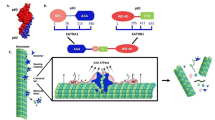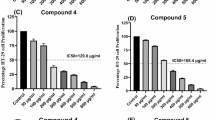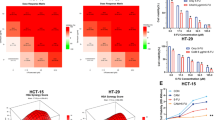Abstract
KINETIN (6-furfurylaminopurine) has been reported to stimulate cell division in excised tobacco pith tissues1, in onion root tips2 and, most recently, in sarcoma tumour cells3. Lettré and Endo4 found no changes in cell division or tumour growth with kinetin in cultures of normal or malignant human and animal cells. They concluded that these tissues either did not possess a kinetin-like trigger for cell division, or contained optimal levels of such a substance.
This is a preview of subscription content, access via your institution
Access options
Subscribe to this journal
Receive 51 print issues and online access
$199.00 per year
only $3.90 per issue
Buy this article
- Purchase on SpringerLink
- Instant access to the full article PDF.
USD 39.95
Prices may be subject to local taxes which are calculated during checkout
Similar content being viewed by others
References
Miller, C. O., et al., J. Amer. Chem. Soc., 77, 2662 (1956).
Guttman, R., Chromosoma, 8, 341 (1956).
Ogawa, Y., et al., Nature, 180, 984 (1957).
Lettré, H., and Endo, H., Naturwiss., 43, 84 (1956).
Author information
Authors and Affiliations
Rights and permissions
About this article
Cite this article
GUTTMAN, R., BACK, A. Effects of Kinetin on Cell Division in Paramecium caudatum . Nature 181, 852 (1958). https://doi.org/10.1038/181852a0
Issue date:
DOI: https://doi.org/10.1038/181852a0
This article is cited by
-
Effect of Kinetin on Bacteria
Nature (1963)
-
Kinetin, as a Mitotic Stimulant in Triturus viridescens
Nature (1962)
-
Kinetin-induced Meiotic-Prophase Acceleration and Stasis in Tradescantia Anthers cultured on Media Deficient in Sugar
Nature (1961)
-
Effects of Kinetin and Indole-3-acetic Acid on Multiplication Rates of Paramecium
Nature (1961)
-
Certain Mitotic Effects of Kinetin, Gibberellic Acid, Indoleacetic Acid, and Maleic Hydrazide on the Root of Allium cepa
Nature (1960)



